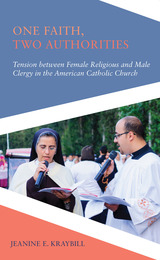
The sexual abuse scandal in the Catholic Church has been exacerbated in the minds of many by the dismal response of church leadership. Uncovered along with the abuse of power were decisions that were not only made in secrecy, but which also magnified the powerlessness of the people of the church to have any say in its governance. Accordingly, many have left the church, many have withheld funding—others have vowed to work for change, as witnessed by the phenomenal growth of Voice of the Faithful. Common Calling is indeed a call—for change, for inclusion, and a place at the table for the laity when it comes to the governance of the church.
By first providing compelling historical precedents of the roles and status of the laity as it functioned during the first millennium, Common Calling compares and contrasts those to the place of the laity today. It is this crossroad—between the past and the possible future of the Catholic Church—where the distinguished contributors to this volume gather in the hope and expectation of change. They examine the distinction between laity and clergy in regard to the power of church governance, and explore the theological interpretation of clergy-laity relations and governance in the teachings of the Second Vatican Council. They look at how church officials interpret the role of the laity today and address the weaknesses in that model. Finally, they speak clearly in outlining the ways governance may be improved, and how—by emphasizing dialogue, participation, gender equality, and loyalty—the role of the laity can be enhanced.
Speaking as active believers and academic specialists, all of the contributors assert that the church must evolve in the 21st century. They represent a variety of disciplines, including systematic theology, sacramental theology, canon law, political science, moral theology, pastoral theology, and management. The book also includes an essay by James Post, cofounder of the Catholic lay movement Voice of the Faithful, the organization that was in part responsible for the resignation of Boston's Cardinal Bernard Law. Common Calling looks to a future of transparency in the Catholic Church that, with an invested laity, will help to prevent any further abuse—especially the abuse of power.

This book explores the Daoist encounter with modernity through the activities of Chen Yingning (1880–1969), a famous lay Daoist master, and his group in early twentieth-century Shanghai. In contrast to the usual narrative of Daoist decay, with its focus on monastic decline, clerical corruption, and popular superstitions, this study tells a story of Daoist resilience, reinvigoration, and revival.
Between the 1920s and 1940s, Chen led a group of urban lay followers in pursuing Daoist self-cultivation techniques as a way of ensuring health, promoting spirituality, forging cultural self-identity, building community, and strengthening the nation. In their efforts to renew and reform Daoism, Chen and his followers became deeply engaged with nationalism, science, the religious reform movements, the new urban print culture, and other forces of modernity.
Since Chen and his fellow practitioners conceived of the Daoist self-cultivation tradition as a public resource, they also transformed it from an “esoteric” pursuit into a public practice, offering a modernizing society a means of managing the body and the mind and of forging a new cultural, spiritual, and religious identity.


While female religious have grown to possess a sense of personal authority in issues impacting the laity, and have come to engage in social-issue-oriented activities, religious institutions have traditionally viewed men as the decision-makers. One Faith, Two Authorities examines the tensions of policy and authority within the gendered nature of the Catholic Church.
Jeanine Kraybilllooks at the influence of Catholic elites—specifically within the U.S. Conference of Catholic Bishops and the Leadership Conference of Women Religious—and their opinions on public policy and relevant gender dynamics with regard to healthcare, homosexuality, immigration, and other issues. She considers the female religious’ inclusive positions as well as their opposition to ACA for bills that would be rooted in institutional positions on procreation, contraception, or abortion. Kraybill also systematically examines the claims of the 2012 Doctrinal Assessment against the Leadership Conference of Women Religious.
One Faith, Two Authorities considerswhether the sisters and the male clergy are in fact in disagreement about social justice and healthcare issues and/or if women religious have influence.
READERS
Browse our collection.
PUBLISHERS
See BiblioVault's publisher services.
STUDENT SERVICES
Files for college accessibility offices.
UChicago Accessibility Resources
home | accessibility | search | about | contact us
BiblioVault ® 2001 - 2024
The University of Chicago Press









